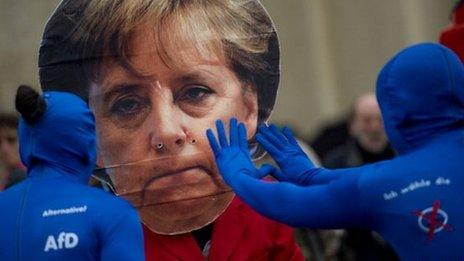German leftists agree historic deal to rule in Thuringia
- Published
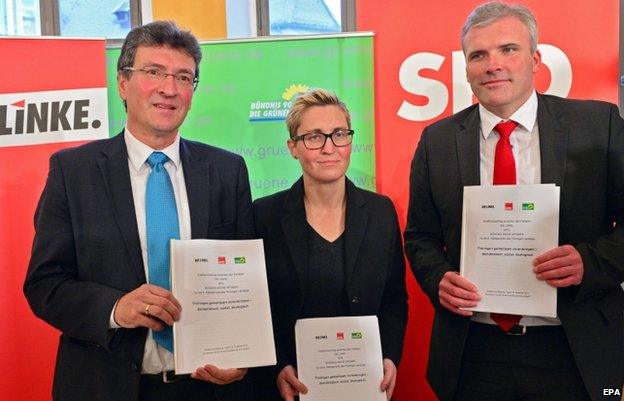
The three party leaders emphasised their agreed condemnation of East Germany in the coalition document
Leftist parties in Germany have agreed a historic coalition deal which will see the first far-left regional president since the fall of communism.
Bodo Ramelow of the socialist Die Linke (Left party) is set to become state premier of Thuringia next month.
Die Linke, rooted in the old East German state Communist party, has never led a state government.
But all three coalition parties said they saw East Germany as a state that did not operate within the rule of law.
What is now Thuringia was part of East Germany during the Cold War but is at the heart of the reunified country.

Broken taboos - by Damien McGuinness, BBC News, Berlin
The region's new political leaders were clear that coalition negotiations were difficult - mainly because until now Die Linke has had pariah status in the eyes of many mainstream politicians.
The party is often accused of being a successor to oppressive East German communism, unwilling to confront the crimes of the past. But alongside a radical programme of radical left-wing policies to please each party - from a ban on fracking to free kindergarten places for the first year - a commitment to addressing the region's controversial communist history was also announced.
The real significance of this new left-wing government is not a sign of a rise of the radical left. Overall support for Die Linke has not risen dramatically over the past few years. Rather, it is proof that the long-fragmented left is getting its act together, and is able to break taboos to co-operate.
Meanwhile Chancellor Angela Merkel finds that her centre-right party is being undermined by the new anti-euro Alternative fuer Deutschland (AfD). Now the rest of the country will be watching closely to see if Thuringia can deliver such left-wing policies affordably.

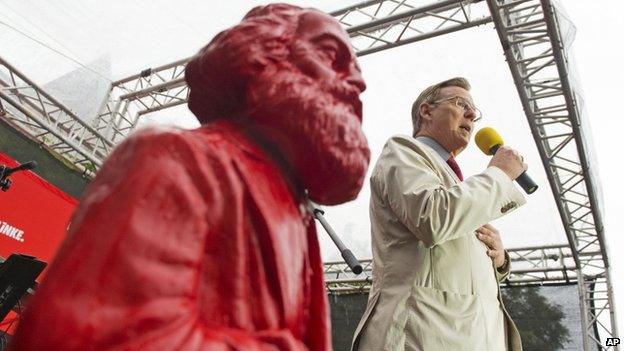
Bodo Ramelow campaigned for the Thuringia election alongside a red bust of Karl Marx
Presenting the unprecedented "red-red-green" coalition, which includes the Social Democrats (SPD) and the Greens, the parties emphasised that dealing with the past had been a major issue in their talks.
Die Linke chairwoman Susanne Hennig-Wellsow told reporters in Erfurt, Thuringia's state capital, that recognition of the German Democratic Republic (DDR) as an "Unrechtsstaat" - a state operating beyond the rule of law - had been included in the preamble to the coalition document.
The Thuringia deal comes barely a week after celebrations marking the 25th anniversary of the fall of Berlin Wall and has angered senior German figures, including President Joachim Gauck, a former dissident pastor in communist East Germany.
People who had lived under communism would "find it quite hard to accept" a socialist-led state government, Mr Gauck said.
In an indication of the party's socialist heritage, Bodo Ramelow delivered campaign speeches ahead of the Thuringia election in September alongside a red bust of Karl Marx.
The Greens said on Thursday that without the agreed declaration on East Germany, they would never have signed up to the coalition deal.
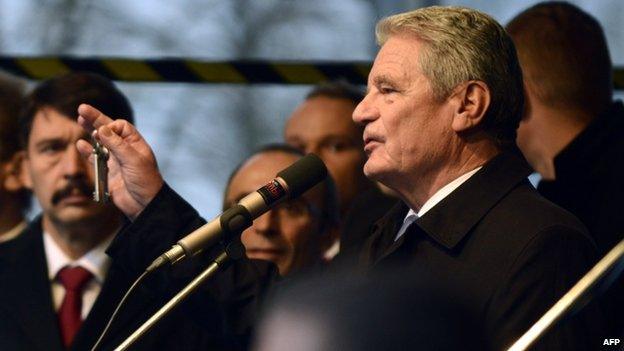
President Joachim Gauck recently departed from protocol to criticise the rise of Die Linke
Mr Ramelow has said that a Linke-led coalition government will pursue "pragmatic policies" and will be a "project of reconciliation".
His appointment is still subject to a vote in the state assembly due on 5 December.
Angela Merkel's conservative Christian Democrats, who rule at national level in coalition with the SPD, are expected to form the opposition in Thuringia. Germany's chancellor also grew up in East Germany.
A spokesman for her CDU party in Thuringia said the coalition could threaten everything that had been achieved there in the past 25 years.
However, Die Linke believe the coalition could send a signal to other states in Germany ahead of the next federal elections in 2017.
- Published15 September 2014
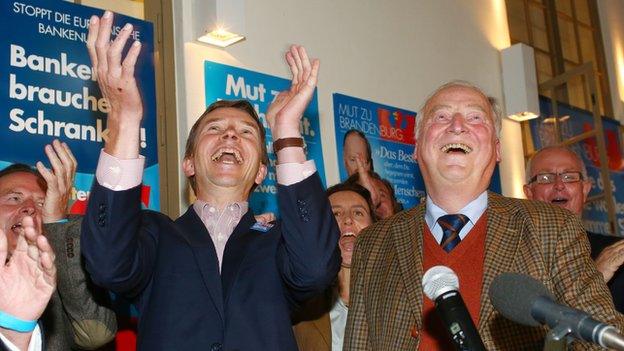
- Published7 May 2014
- Published12 May 2014
